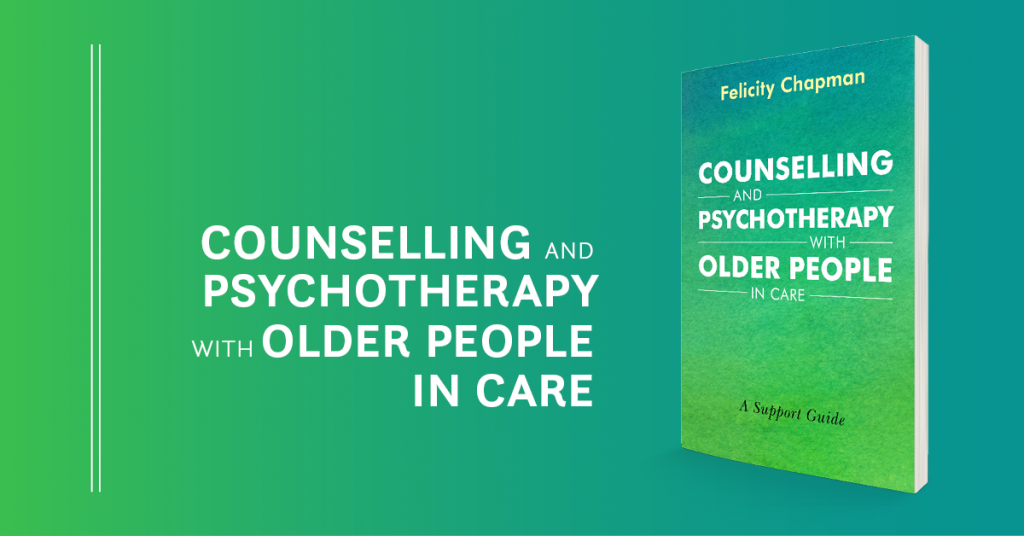Felicity Chapman, author of Counselling and Psychotherapy with Older People in Care, is an accredited mental health social worker who has extensive training and experience in psychotherapy and specialises in work with seniors both in the community and facility settings. Here, she talks about the importance of senior-friendly practices and redefining our relationship with “old age” and aged care.
We know about our ageing population. We know that, soon, it won’t be a skateboarding teenager that we’ll have to look out for while taking a stroll outside but a speeding mobility scooter – but what about our relationship with “old age” and all those who represent it?
Is it a passionate love affair or something we just do? Or maybe it is something that we can’t even fudge an interest in. Too “urgh” to even think about. If that’s you – I hear ya’. What’s a person to do when all that is blaring in their ears is to “fight the signs of ageing”? Beat that “old age” monster back (only with a certain product of course).
And what about our throw-away society? Much as we might not want to replace and dispose, many of us have little choice. Your eight-year-old washing machine stops working. What to do? Shell out a lot of money to try and fix it or spend not much more on a brand new one? Yep, planned obsolesce is certainly in-built in our life.
You see, even if we have the best of intentions, “old” can become synonymous with “urgh” or “obsolete”. What does this mean for how we view other things when they are old? People when they are old?
I’m not wanting you to hug every grandma you meet or guilt you in to acts of service for older adult populations. I am just appreciating the social milieu that surrounds our Western world when it comes to how we view this thing called “old age” and how much we value, or not, our elders.
My question to you is this – is it time to “bring sexy back” to how we view aged care?
It seems like a good time to me. We know the clock is ticking and our cohort of seniors is growing day by day, and living longer. I don’t like being affected by dire warnings of a “grey tsunami” but I do think that now is the time to see our ageing population as an opportunity to celebrate age and all those who represent “old age”.
So, what does it mean to “bring sexy back” to how we view aged care or older adults?
I’m sure Justin Timberlake did not have older adults in mind when he sung “I’m bringing sexy back…” Sexy is often everything that aged care is not. But by using the word “sexy” I am not referring to the high octane experience of being intimate with someone. Who knows though, older adults may well want to talk about such things! How senior friendly to encourage this?
What I mean when I talk about “bringing sexy back” is bringing a sense of spice or pizzazz associated with respect back to our Western society that appears to have lost its way in valuing seniors. I am a social worker before I am a psychotherapist. It seems perfectly natural to me to examine systems at all levels and not accept the status quo if it is at odds with a senior-friendly practice.
Nothing, I believe, should be exempt. From community attitudes, to what governments will fund, to social policy, our learning institutions, organisational mandates and the field of geropsychology – all should be fodder for our discerning eye as we look through the lens of valuing seniors. Bringing sexy back for me means to ensure that, as a society, we are senior friendly and celebrate age in all that we do.
This is not limited to healthy ageing campaigns or practices, as good as they are. As a social worker and a gerontological psychotherapist I am interested in models that extend the good that already exists and challenges what has not yet been challenged. From the way that older adults are engaged with psychotherapeutically through to how our governments and industry prioritise senior health and emotional wellbeing. All systems need to be scrutinized for how senior friendly they are.
For the sake of the current group of advanced seniors – and all of those who will surely follow – it is in humanity’s best interest to develop senior-friendly practices and be excited about the opportunities that await us when we turn our personal and professional energies toward redefining our relationship with “old age” and aged care. In the field of psychology, experts are lamenting a lack of interest in aged care, worldwide.
I hope that my book Counselling and Psychotherapy with Older People in Care: A Support Guide can go some way toward exciting and equipping workers – not just psychologists – who are either thinking of “dipping their toe in” to the aged care sector or who are fully immersed already. I also hope that it offers new horizons of thought in how we, as a society, relate to this thing called “old age” and aged care. Whether you are in to aged care or not, I’m sure you’ll agree that everyone on this planet deserves respect and dignity – especially when we are at our most vulnerable.
And if you think that psychotherapeutic work with older adults or aged care is staid and boring. Think again! What a rich mix of things to navigate. It’s seriously interesting!
It is – I think – a little bit sexy.
